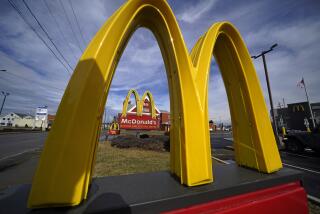Restaurants in China, U.S., Europe reflect global economy

Looking for evidence of China’s economic prowess, Europe’s malaise and consumer ennui in the U.S.? Use the international restaurant industry as a barometer, according to a report this week.
China’s economy, coming off a period of blistering growth, is expanding at its slowest rate in years. But the Asian superpower is still projected to account for 40% of this year’s global growth, according to the World Bank.
That increase is evident in China’s restaurants, according to research firm NPD Group. Traffic to food service operators in the country saw double-digit percentage gains in the third quarter compared with the year-earlier period. Spending at restaurants -- at $3.38 for an average check -- is up 26.1%.
Major American companies such as KFC owner Yum Brands and McDonald’s have poured into China in recent years, though the former has recently struggled with a sales slip and food safety concerns in the country. Nearly half of Yum’s overall revenues come from China.
Restaurant visits are down across Europe. The ongoing sovereign debt crisis and austerity-depressed consumer confidence has caused patrons to scale back on eating out in France, Germany, Italy and Spain, according to NPD.
Spending is down 4.3% in Spain and down 2.2% in Italy.
The dining industry is flat in Japan. After the earthquake and tsunami in 2011, Japanese consumers swarmed into restaurants in an effort to support the local economy. Since then, according to NPD, they’ve backed off.
Still, the average check in Japan is, at $8.90, the highest in the world. China has the lowest average dining bill. In the U.S., it’s $6.35.
American restaurants are seeing slow growth in spending, which was up 2.1% in the third quarter. A new report Friday from Thomson Reuters/University of Michigan showed U.S. consumer confidence plunging to a five-month low amid fiscal cliff fears.
American spending, however, rose, according to the Commerce Department.
“Consumer confidence is weak and whether it’s concern for inflation in China, fatigue from propping the economy up in Japan or continued high unemployment in Spain, consumers aren’t exhibiting a great deal of optimism, and the food service markets around the world are lackluster as a result,” said Bob O’Brien, NPD’s global senior vice president for food service, in a statement.
ALSO:
Economists see mediocre growth in 2013
Missteps, ‘Obamacare’ flap dent Olive Garden owner’s profit
New Peet’s owner Benckiser to buy Caribou Coffee for $340 million
More to Read
Inside the business of entertainment
The Wide Shot brings you news, analysis and insights on everything from streaming wars to production — and what it all means for the future.
You may occasionally receive promotional content from the Los Angeles Times.











